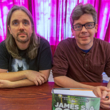Alien clay
Description
More Details
9781668642702
9780316578981
Similar Titles From NoveList
Similar Authors From NoveList
Published Reviews
Booklist Review
Contracted scientists and guards arrive on research labor camp Imno 27g--30 years away from Earth--in a starship. Political prisoners, on the other hand, arrive in a craft that self-destructs after breaking through the atmosphere and hope their parachutes open. To rebel against the Mandate is a one-way ticket to toil under this alien sky, where ruins must be uncovered by Excursion crews, revealing what appear to be signs of intelligence. Dig Support then retrieves what they can to study under the strictures of the dome where everyone lives. The planet's surface is teeming with life, which is a strange lab of organic components that intermix to form useful symbiotic relationships. They haven't quite worked out how humans fit in, but they're working on it. The men and women on the planet they call Kiln will soon learn how aptly they named their new home. Written in a gritty, first-person style, Tchaikovsky's latest (after Service Model, 2024) reveals that the clash is more than just between human and alien but between ideologies that can blind one from harsh realities.
Publisher's Weekly Review
Imprisoned dissident scientists struggle to understand alien ecology in this mind-expanding planetary romp from Arthur C. Clarke Award winner Tchaikovsky (Service Model). Arton Daghdev, captured by the totalitarian Earth government called the Mandate after a year in hiding, lands on the prison planet Kiln, where he is assigned to support archeological digs into the beehive-shaped mounds left by a vanished civilization. Caught between fellow prisoners planning a rebellion and a warden who espouses the Mandate party line--that the Universe was designed to produce humanity as its pinnacle achievement--Daghdev forges his own path into the heart of Kiln's vitally different life-forms. ("Know thyself is the Earth adage, but here on Kiln it's Know one another," he muses of their strikingly different culture.) Tchaikovsky's philosophical musings about identity and the individual against the collective will feel familiar to science fiction readers, but his resolution will surprise even longtime genre fans. Tchaikovsky continues to impress. Agent: Simon Kavanagh, Mic Cheetham Agency. (Sept.)
Library Journal Review
Tchaikovsky (Lords of Uncreation) once again secures his place in the modern science fiction canon. Throughout the story, Tchaikovsky effortlessly weaves together political conflict and extraterrestrial survival, neatly connecting the seemingly disparate pieces. Ecobiologist Artom Daghdev is sentenced to exile on a distant and hostile planet, Kiln, for his resistance to the authoritarian Mandate. Daghdev has to balance his scientific study of the planet against the competing interests of his Mandate overseer, who courts Daghdev's scholarship and that of his fellow revolutionaries, who are plagued by suspicions of traitors in the ranks. The unraveling of the mystery of life on Kiln will keep listeners equal parts horrified and fascinated, and the tension among characters who struggle to trust one another helps maintain a sense of unease in what could otherwise be a sluggish scene. Ben Allen's narration is a perfect pairing for Tchaikovsky's work; Daghdev's sardonic, gallows humor could become irritating in the wrong delivery, but Allen speaks with a natural dryness and control that keeps the asides from disrupting the narrative. VERDICT Tchaikovsky delivers another resounding success that will find an audience anywhere science fiction is popular.--Collin Stephenson
Kirkus Book Review
A dissident is condemned to dangerous work on a distant world containing mysterious ruins from a vanished alien society. Professor Arton Daghdev's xenobiology research violates the orthodox principles of the governing Mandate, which dictates that science must support the idea that humans are the pinnacle of all evolution, everywhere. He's also been secretly dabbling in more direct revolution--or at least,talking about it--but the authorities don't know that. For his academic trespasses, he's shipped off to serve as convict labor on the planet Kiln, where ancient ruins suggest there was once an intelligent race. His job is to find the remains of this race and furnish evidence of just how much like humanity it was. Instead, he discovers a world full of metaspecies--communities of symbiotes who have united into single organisms--and a sullen population of convicts who cannot trust each other enough to pull off a successful uprising against the sadistic commandant and brutal guards. The symbiotes of Kiln seem anxious to add humans to their collection; unfortunately, such attempts usually lead to madness and/or death for the human. But a catastrophic encounter with one such group of life-forms provides Arton and his fellows with both insight into the race of the builders and a possible way of winning liberation. The biological puzzle of life on Kiln depicted here is fascinating, reminiscent of biologist/SF author Joan Slonczewski'sThe Children Star (1998). The biological aspect of the story is a tool to support Tchaikovsky's primary message, which is a vivid illustration of how suspicion can undermine both an authoritarian regime and any potential resistance to that regime. In this novel, a lack of honesty and poor communication can literally kill. But at the same time, all talk and no action is no path to success, either. A savagely satirical take on the consequences of repressive doctrine and the power of collective action. Copyright (c) Kirkus Reviews, used with permission.
Booklist Reviews
Contracted scientists and guards arrive on research labor camp Imno 27g—30 years away from Earth—in a starship. Political prisoners, on the other hand, arrive in a craft that self-destructs after breaking through the atmosphere and hope their parachutes open. To rebel against the Mandate is a one-way ticket to toil under this alien sky, where ruins must be uncovered by Excursion crews, revealing what appear to be signs of intelligence. Dig Support then retrieves what they can to study under the strictures of the dome where everyone lives. The planet's surface is teeming with life, which is a strange lab of organic components that intermix to form useful symbiotic relationships. They haven't quite worked out how humans fit in, but they're working on it. The men and women on the planet they call Kiln will soon learn how aptly they named their new home. Written in a gritty, first-person style, Tchaikovsky's latest (after Service Model, 2024) reveals that the clash is more than just between human and alien but between ideologies that can blind one from harsh realities. Copyright 2024 Booklist Reviews.
Library Journal Reviews
Professor Daghdev is a revolutionary advocate for knowledge and reason who turns up his nose at the orthodoxy of the Mandate. The Mandate corrupts the creed of science, so Daghdev is proud of his role as a political delinquent, right up until he's deported and shipped off to the labor camp on the remote planet of Kiln. Once there, he encounters signs of extrasolar life, and he collaborates with the other dissident expendables to unravel the mystery behind Kiln's vanished civilization. Tchaikovsky (Lords of Uncreation) is a maestro of grim and claustrophobic science fiction, and his imagination knows no bounds. This is a prison drama set in a creepy alien world, with a dash of body horror and several parasitical nightmares. Daghdev is a flippant narrator who endures an endless gauntlet of extreme scenarios, and the disturbing imagery enriches the worldbuilding. His role as a free thinker also allows for a novel exploration of xenoscience, symbiotic relationships, and divergent evolution. VERDICT This engaging book is perfect for those who enjoyed Tchaikovsky's Cage of Souls and for fans of Annihilation by Jeff VanderMeer.—Andrea Dyba
Copyright 2024 Library Journal.Publishers Weekly Reviews
Imprisoned dissident scientists struggle to understand alien ecology in this mind-expanding planetary romp from Arthur C. Clarke Award winner Tchaikovsky (Service Model). Arton Daghdev, captured by the totalitarian Earth government called the Mandate after a year in hiding, lands on the prison planet Kiln, where he is assigned to support archeological digs into the beehive-shaped mounds left by a vanished civilization. Caught between fellow prisoners planning a rebellion and a warden who espouses the Mandate party line—that the Universe was designed to produce humanity as its pinnacle achievement—Daghdev forges his own path into the heart of Kiln's vitally different life-forms. ("Know thyself is the Earth adage, but here on Kiln it's Know one another," he muses of their strikingly different culture.) Tchaikovsky's philosophical musings about identity and the individual against the collective will feel familiar to science fiction readers, but his resolution will surprise even longtime genre fans. Tchaikovsky continues to impress. Agent: Simon Kavanagh, Mic Cheetham Agency. (Sept.)
Copyright 2024 Publishers Weekly.































